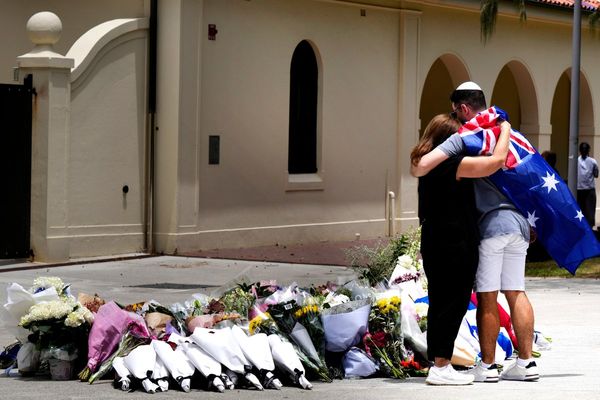
Most festival organisers might panic upon discovering their headliner has Covid. But if the news that Rachel Aggs now can’t close the second night of Decolonise Fest shakes the confidence of Stephanie Phillips, it doesn’t show as she calmly multitasks finding a replacement and welcoming the volunteers staffing the event at this east London taproom later tonight. Phillips founded the DIY festival in 2017 to “foster a community of like-minded people” and centre “the experiences of punx of colour”. The show must go on. “The festival is necessary, it’s needed in the scene,” she says, with characteristic quiet determination.
Decolonise Fest is but one string to Phillips’ bow. A journalist and author, she’s also singer and guitarist in Big Joanie, the punk group she formed almost a decade ago with drummer Chardine Taylor-Stone. The pair first met at Imkaan, a Black feminist organisation. “Young women were engaging with feminism again,” says Taylor-Stone later at Haggerston’s Signature Brew, “but the mainstream was very white. I wanted to find Black feminist spaces, and discuss writers like Audre Lorde and bell hooks.” At Imkaan, she rubbed shoulders with author Reni Eddo-Lodge and journalist Lola Okolosie. But it was Phillips, the Wolverhampton-raised woman with a tote bag celebrating post-punks the Raincoats, who made the deepest impression.
“We met later in Brixton to discuss starting a band,” says Phillips. A diehard Destiny’s Child fan in her youth, as a teenager Phillips had been seduced by Bloc Party, My Chemical Romance and the riot grrrl movement. Her first band, a chaotic outfit improbably named My Therapist Says Hot Damn!, proved a frustrating experience. In her excellent 2021 book, Why Solange Matters – a celebration of the other Knowles sister that deftly doubles as Phillips’ own memoir – she wrote of the sensation of words within her “rushing to get out – but I didn’t know how to release them”.
In Big Joanie, Phillips found her voice. Accompanied by Taylor-Stone – playing stand-up drums in tribute to her beloved Jesus and Mary Chain – and founding bassist Kiera Coward-Deyell (later replaced by Estella Adeyeri), Phillips’ new songs eschewed polemic sloganeering in favour of sly wit (Token) and cathartic confessions (Used to Be Friends). Styling themselves as “riot grrrl meets the Ronettes, with a sprinkling of dashikis”, they were Black, feminist and proud. “It wasn’t an explicit political act,” says Taylor-Stone. “But making music with other Black women felt cool. To no longer be the only Black musicians in a group meant there was no need to code-switch whatsoever – we could be our full selves.”
Debuting at a London showcase for bands’ first-ever gigs, they were fielding offers of further gigs as soon they walked offstage. At one early show they met Sonic Youth’s Thurston Moore, who signed them to his Daydream Library Series label, releasing their 2018 debut album, Sistahs. Support slots with heroes such as Sleater-Kinney, Skunk Anansie and the Gossip, meanwhile, bred a taste for larger stages, which helped shape Back Home, the follow-up to Sistahs. “We’re a DIY band, but this is an ambitious album,” says Taylor-Stone. “Those bands started off on scenes like ours and built themselves up to fill spaces like Brixton Academy. We want to headline those stages ourselves, so we’ve made a record that works on that scale.”

Indeed, Back Home is every bit as emotionally complex and personal as its predecessor, but hews closer to the group’s love of hooks, their playful fusion of abrasion and melody. Phillips cites Throwing Muses’ “weird stumbling path” towards pop as a foundational influence, while Taylor-Stone name-checks Buzzcocks, because “they had tunes, they told stories”. But the confidence of Back Home’s bruised pop belies the scattered, chaotic nature of its creation. London rents had seen Taylor-Stone relocate to Manchester and Phillips to Birmingham, with only Adeyeri remaining in the capital. “It just means we have to catch a lot more trains,” Taylor-Stone jokes, but this reality has complicated Big Joanie’s operations. “It’s not like in the 70s, when groups could squat or sign on,” she adds. “It’s incredibly hard to be an artist right now.”
The struggle is real. But Big Joanie are lifers, committed to and sustained by the community they’ve built. “I love the opportunity to make your own culture,” Phillips says, referencing Decolonise Fest, but also Big Joanie’s burgeoning fanbase. “I don’t always have a specific audience in mind when I’m writing songs,” she adds, “but I hope that everything we do is always relevant for the Black community and, specifically, Black women – that they feel seen and heard in our songs and what we do.
“People call us a lot of things, but we’re still punk,” she adds, “Because, for me, ‘punk’ means freedom. It’s open, and constantly growing. When I was a teenager, I wanted to sing along with music but I was very shy. But now I sing all the time. To be able to put that noise and anxiety and energy out into the world – that’s the release I always needed.”
• Back Home is released on 4 November via Daydream Library Series







